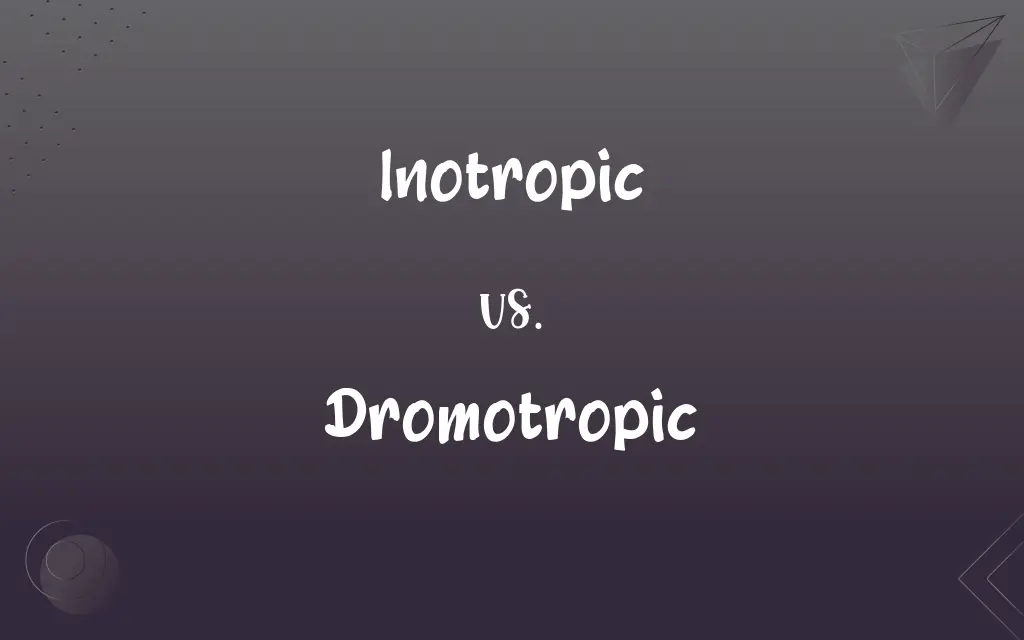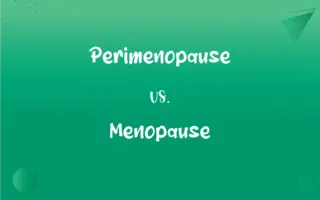Inotropic vs. Dromotropic: What's the Difference?
Edited by Janet White || By Harlon Moss || Updated on October 27, 2023
Inotropic refers to the force of heart muscle contraction, while dromotropic relates to the speed of electrical conduction in the heart.

Key Differences
Inotropic effects influence the strength or force of heart muscle contractions. Dromotropic effects, in contrast, affect the rate of electrical conduction through the heart. Both terms are crucial in understanding cardiac function, but they target different aspects.
Inotropic agents can either strengthen (positive inotropes) or weaken (negative inotropes) heart contractions. Dromotropic substances, on the other hand, can either accelerate (positive dromotropes) or decelerate (negative dromotropes) the electrical signals in the heart.
In clinical settings, inotropic drugs are often used to manage heart failure by improving cardiac output. Dromotropic agents are used to address arrhythmias by altering the speed of electrical impulses in the heart.
The inotropic state of the heart significantly impacts blood circulation. Dromotropic properties are vital in maintaining a regular heartbeat rhythm, ensuring the heart functions efficiently.
Inotropic and dromotropic effects can be influenced by various factors, including medications, electrolyte imbalances, and certain medical conditions, each affecting the heart's functionality differently.
ADVERTISEMENT
Comparison Chart
Definition
Relates to force of heart contractions
Relates to speed of electrical conduction
Effect on Heart
Alters contraction strength
Changes conduction rate
Clinical Use
Treats heart failure
Manages arrhythmias
Types of Agents
Positive and negative inotropes
Positive and negative dromotropes
Impact on Cardiac Function
Influences blood circulation
Regulates heartbeat rhythm
ADVERTISEMENT
Inotropic and Dromotropic Definitions
Inotropic
Inotropic involves the intensity of heart contractions.
Inotropic support is crucial for patients with weakened heart muscles.
Dromotropic
Dromotropic relates to agents affecting cardiac conduction velocity.
The new drug showed promising dromotropic properties in slowing down rapid heartbeats.
Inotropic
Inotropic describes the change in heart muscle power.
Due to his heart condition, he requires medication with inotropic properties.
Dromotropic
Dromotropic refers to the speed of electrical conduction in the heart.
The doctor adjusted her medication to improve the dromotropic effect on her arrhythmia.
Inotropic
Inotropic refers to the force of cardiac muscle contraction.
The inotropic effect of the drug improved the patient's heart function.
Dromotropic
Dromotropic concerns the pace of cardiac electrical activity.
Her dromotropic condition required careful monitoring and medication adjustments.
Inotropic
Inotropic pertains to agents altering heart contractility.
The doctor prescribed a positive inotropic medication to strengthen the heart's pumping ability.
Dromotropic
Dromotropic involves the rate of electrical impulses in the heart.
To normalize his heartbeat, the cardiologist prescribed a medication with negative dromotropic effects.
Inotropic
Inotropic concerns the vigor of cardiac contractions.
After the surgery, the patient was put on inotropic therapy to maintain heart function.
Dromotropic
Dromotropic describes changes in heart conduction speed.
Dromotropic agents are essential in managing his atrial fibrillation.
Inotropic
Affecting the contraction of muscle, especially heart muscle
An inotropic drug.
Dromotropic
(physiology) Affecting the conductivity of cardiac muscle, used of the influence of cardiac nerves.
Inotropic
(physiology) Increasing or decreasing the force of muscular contractions.
Inotropic
An inotropic heart drug.
FAQs
What does inotropic mean?
It refers to the force of heart muscle contractions.
What is a dromotropic effect?
It's the impact on the speed of electrical conduction in the heart.
What does negative dromotropic mean?
It refers to a substance that slows down the heart's electrical conduction.
Can drugs have both inotropic and dromotropic effects?
Yes, some drugs can influence both heart contraction and conduction.
What is a positive inotropic agent?
It's a substance that increases the strength of heart contractions.
Can lifestyle changes improve inotropic function?
Healthy lifestyle choices can positively impact heart health.
Is caffeine a dromotropic agent?
Yes, caffeine can have dromotropic effects by increasing heart rate.
What are common inotropic drugs?
Examples include digoxin, dopamine, and dobutamine.
Are there natural dromotropic substances?
Yes, certain herbs and nutrients can have dromotropic effects.
How do inotropic agents help in heart failure?
They improve cardiac output by strengthening heart contractions.
Can inotropic effects be negative?
Yes, negative inotropes decrease heart contraction force.
What medical conditions require inotropic support?
Conditions like heart failure and cardiogenic shock.
Can dromotropic drugs cause side effects?
Yes, like any medication, they can have potential side effects.
Is digoxin both inotropic and dromotropic?
Yes, digoxin has both positive inotropic and negative dromotropic effects.
Are dromotropic effects immediate?
They can be, depending on the drug and individual response.
Can exercise have dromotropic effects?
Yes, exercise can improve cardiac conduction efficiency.
Are inotropic effects measurable?
Yes, through cardiac output and ejection fraction assessments.
Are inotropic effects always beneficial?
Not always. Excessive inotropic stimulation can strain the heart.
Can dromotropic agents cure arrhythmias?
They can manage arrhythmias but not necessarily cure them.
Do dromotropic agents affect blood pressure?
Indirectly, by altering heart rhythm and cardiac output.
About Author
Written by
Harlon MossHarlon is a seasoned quality moderator and accomplished content writer for Difference Wiki. An alumnus of the prestigious University of California, he earned his degree in Computer Science. Leveraging his academic background, Harlon brings a meticulous and informed perspective to his work, ensuring content accuracy and excellence.
Edited by
Janet WhiteJanet White has been an esteemed writer and blogger for Difference Wiki. Holding a Master's degree in Science and Medical Journalism from the prestigious Boston University, she has consistently demonstrated her expertise and passion for her field. When she's not immersed in her work, Janet relishes her time exercising, delving into a good book, and cherishing moments with friends and family.
































































